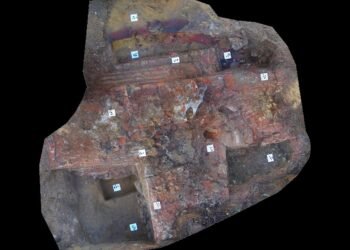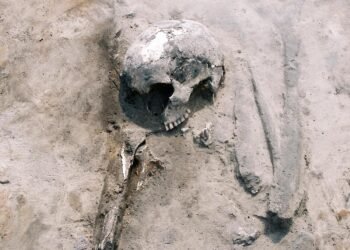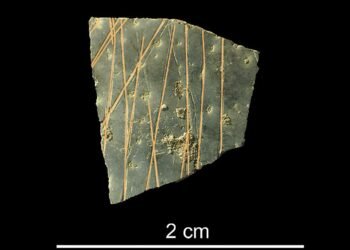Archaeologists exploring the historical castle at Ćmielów in the Świętokrzyskie Voivodeship of Poland have unearthed a stone-carved board game believed to date back to the 16th century.
The game board, carved into a sandstone floor slab, measures approximately 13.5 centimeters in both length and width. Archaeologist Tomasz Olszacki made this remarkable find during excavations at the castle.
While the exact origins of the board game remain shrouded in mystery, it is widely believed to be a variant of the strategic board game called “Mill.” This game, known by various names such as Nine Men’s Morris, Merels, or “cowboy checkers” in North America, has ancient roots and was enjoyed by diverse cultures throughout history, including the Romans and Confucius.

Mill, a game typically played by two players, involves forming lines of three of one’s nine pieces either horizontally or vertically, which constitutes a “mill” and allows the player to remove one of the opponent’s pieces from the board. The carved board found at Ćmielów Castle, while not as old as some ancient boards, is a testament to the enduring popularity of this strategic pastime.
One theory put forth by Olszacki suggests that the board game could have been carved by construction workers looking to pass the time and perhaps gamble their earnings during leisure breaks. Alternatively, it might have been created later by children or servants residing in the castle.
Such stone-carved game boards are not unique to Ćmielów Castle, as similar discoveries have been made in medieval England, Italy, and Crusader castles. These game boards raise questions about whether they were used for leisure or held symbolic or even magical significance.
The castle itself has a rich and diverse history. Built between 1519 and 1531 under the orders of local nobleman Krzysztof Szydowiecki, it experienced multiple changes in ownership and purposes over the centuries. It was captured during the Swedish Deluge and was subsequently used as a brewery, a bathhouse, and a German military hospital during different periods.
After being privately acquired in 2009, the castle experienced a period of neglect before being repurchased in 2022 by a businessman from Gdańsk.
This artifact serves as a testament to the enduring popularity of board games throughout history.





















